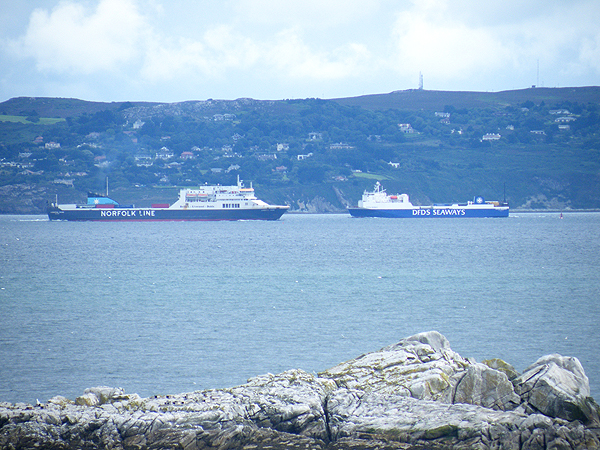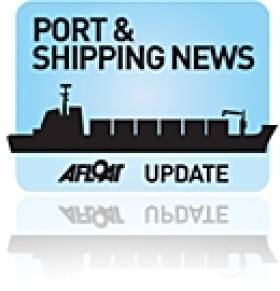Displaying items by tag: DFDS Seaways
DFDS Seaways Show True Colours on Irish Sea
The acquisition of Norfolk Line (a subsidairy of Danish shipping giant, Maersk) by DFDS Seaways was finally completed in July writes Jehan Ashmore. Though it is only now that the visual signs of this takeover are becoming increasingly apparent on the Irish Sea.
The Maersk Exporter, was the first of the former Norfolk Line fleet to undergo changes with a new corporate livery scheme. This saw the pale 'Maersk' blue hull colours replaced with a darker shade of blue representing DFDS Seaways. The Chinese built 114-truck trailer freight-ferry was dry-docked at Cammell Laird shipyard, Birkenhead to emerge on the Mersey also sporting a new name, Scotia Seaways. Sisterships, Maersk Importer has been re-named Hibernia Seaways leaving the third in the trio of 13,000 gross tonnes freighters, Maersk Anglia to receive re-branding.
DFDS Seaways not only operate these vessels but also a pair of freight-ferries on routes from Heysham to Belfast, Dublin and Larne, the later route was only launched in May. In addition DFDS inherit four ro-pax passenger ferries, built at the Italian Visentini shipyard, that Norfolkline operated from Twelve Quays Ferry Terminal, Birkenhead on routes to Belfast and Dublin.
The acquisition will see DFDS Seaways continue to operate these vessels and routes. This has also led to a phased rebranding of the ferry fleet. On the Birkenhead-Belfast route, the newly renamed Mersey Seaways (ex. Mersey Viking) is also joined by Dublin Seaways (ex. Dublin Viking) which is away from the Dublin route to deputise while
the Lagan Seaways (ex. Liverpool Viking) currently undergoes a similar re-branding exercise at Cammel Laird. Birkenhead-Dublin sailings are covered by Liverpool Seaways (ex. Liverpool Viking) which made an inaugural call to Dublin on 18 August, under the new name, albeit retaining most of the predecessors livery. With Dublin Seaways serving Belfast sailings, DFDS Seaways chartered P&O Ferries, Dover-based ro-pax European Endeavour, allowing Lagan Seaways to be dry-docked.
DFDS Seaways entry onto the Irish Sea scene is set amidst challenging market conditions as the ferry industry faces issues of over-capacity and reduced trade from the heady boom years. The most intense competition is on the central corridor routes, particularly Dublin to Merseyside (Birkenhead/Liverpool) and the shorter-sea route to Holyhead.
Outside the Irish Sea, DFDS Seaways, are a large transport and logistics operator with over 60 vessels operating an extensive route network stretching across western Europe, from the English Channel, the North Sea, Scandinavia and as far east to the Baltic Sea port of St. Peterburgh in the Russian Federation.

























































